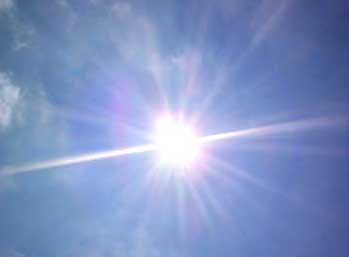 Heat Exhaustion and Heat Stroke Overview
Heat exhaustion: This condition often occurs when people exercise (work or play) in a hot, humid place and body fluids are lost through sweating, causing the body to overheat. The person"s temperature may be elevated, but not above 104*F.
Heat stroke: This medical condition is life-threatening. The persons cooling system, which is controlled by the brain, stops working and the internal body temperature rises to the point where brain damage or damage to other internal organs may result (temperature may reach 105+*F).
Heat Exhaustion and Heat Stroke Causes
Heat exhaustion is typically caused when people who are not well adjusted to heat exercise in a hot, humid environment.
• At high temperatures, the body cools itself largely through evaporation of sweat.
• When it is very humid, this mechanism does not work properly.
• The body loses a combination of fluids and salts (electrolytes).
• When this is accompanied by an inadequate replacement of fluids, disturbances in the circulation may result that are similar to a mild form of shock.
Heat stroke may often develop rapidly.
• Medical conditions or medications that impair the body"s ability to sweat may predispose people to this problem.
• Heat stroke happens in the following two ways:
o The classic form occurs in people whose cooling mechanisms are impaired.
o The exertional form occurs in previously healthy people who are undergoing strenuous activity in a hot environment.
• Infants and the elderly are more likely to have this problem, as are those who are taking antihistamines and certain types of medication for high blood pressure or depression.
Heat Exhaustion and Heat Stroke Symptoms
Heat exhaustion symptoms
• Often pale with cool, moist skin
• Sweating profusely
• Muscle cramps or pains
• Feels faint or dizzy
• May complain of headache, weakness, thirst, and nausea
• Core (rectal) temperature elevated-usually more than 100*F-and the pulse rate increased
Heat stroke symptoms
• Unconscious or has a markedly abnormal mental status (dizziness, confusion, hallucinations, or coma)
• Flushed, hot, and dry skin (although it may be moist initially from previous sweating or from attempts to cool the person with water)
• May have slightly elevated blood pressure at first that falls later
• May be hyperventilating
• Rectal (core) temperature of 105?F or more
Self-Care at Home
Home care is appropriate for mild forms of heat exhaustion. Heat stroke is a medical emergency, and an ambulance should be called immediately.
• For mild cases of heat exhaustion
o Rest in a cool, shaded area.
o Give cool fluids such as water or sports drinks (that will replace the salt that has been lost). Salty snacks are appropriate as tolerated.
o Loosen or remove clothing.
o Apply cool water to skin.
o Do not use an alcohol rub.
o Do not give any beverages containing alcohol or caffeine.
• Heat stroke (do not attempt to treat a case of heat stroke at home, but you can help while waiting for medical assistance to arrive.)
o Call 911 immediately
o Move the person to a cooler environment, or place him or her in a cool bath of water (as long as he or she is conscious and can be attended continuously).
o Alternatively, moisten the skin with lukewarm water and use a fan to blow cool air across the skin.
o Give cool beverages by mouth only if the person has a normal mental state and can tolerate it.
Prevention
Avoid heat exhaustion by not engaging in strenuous activity in hot, humid environments. People who are not used to the heat should be particularly careful. Intersperse periods of rest in a cool environment with plenty of available fluids to drink. Avoid strenuous activities during the hottest part of the day.
Heat stroke often occurs in people who are unable to modify their environments: infants, the elderly, and bed-ridden people. People who are taking many types of blood pressure, allergy, or depression medication may also be particularly at risk and should avoid hot environments.
People in supervisory positions such as coaches, trainers, and lifeguards should be trained to specifically recognize signs of heat illness and what preventive measures to take.
|



